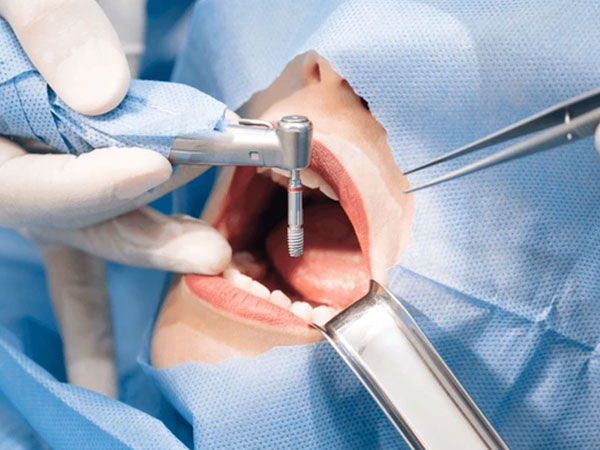Dental implants can be a life-changing decision, bringing back the confidence in your smile.
But what exactly does the process entail, and what can you expect along the way?
Say goodbye to uncertainties as we unravel the step-by-step journey of getting dental implants. From pain management to the best age for implants, we’ve got your concerns covered.
Read this enlightening exploration, and let’s pave the way for your radiant, worry-free smile!
What to Expect During a Dental Implant Surgery
When it comes to dental implant surgery, understanding the process can help ease any apprehensions. The procedure generally involves multiple stages, beginning with a thorough examination and the placement of a small titanium post into the jawbone. This post acts as the foundation for your new tooth.
During the surgery, you’ll be under local anesthesia, ensuring a comfortable experience. While mild soreness is common after the procedure, your dentist will provide post-operative care guidelines and prescribe medications to manage any discomfort.
1. Initial Examination
Before diving into the surgery, a thorough initial examination is conducted by our experienced dental professionals. This step involves comprehensive assessments, including X-rays and a detailed review of your oral health. The goal is to create a personalized plan tailored to your specific needs, ensuring the success of your dental implant journey.
2. Tooth Removal
In some cases, tooth removal may be necessary to pave the way for dental implants. Our skilled team ensures a precise and painless extraction process, utilizing advanced techniques to minimize discomfort. This step sets the stage for the implant placement, allowing for a seamless transition to the next phase of your treatment.
3. Bone Grafting
Before dental implant placement, your dentist may recommend bone grafting to ensure a sturdy foundation for the implant. This process involves augmenting the jawbone if needed, creating an optimal environment for a successful implant. Don’t worry; your dentist will discuss this option with you, explaining the importance of a strong base for lasting results.
4. Dental Implant Placement
The core of the procedure involves implanting a small titanium post into the jawbone. This acts as the artificial root for your new tooth. While the idea might sound complex, rest assured that the procedure is meticulously executed under local anesthesia. Your comfort is a priority, and advancements in dental technology ensure precision and efficiency during implant placement.
5. Abutment Placement
Once the implant fuses with the jawbone, the next step is abutment placement. The abutment is a connector piece that links the implant to the prosthetic tooth. This minor but crucial step sets the stage for the final restoration. Your dentist will carefully place the abutment, ensuring a secure connection and preparing for the last phase of the implant process.
6. Select Your New Artificial Teeth
Choosing the right artificial teeth is a crucial step in the dental implant journey. Your dentist will work closely with you to determine the best type of dental prosthetic, considering factors like material, size, and shape. Whether you opt for individual crowns or implant-supported bridges, the goal is to achieve a natural-looking and functional result. This customization ensures that your new teeth seamlessly integrate with your existing smile, providing a long-lasting and aesthetically pleasing outcome.
7. Aftercare
Post-implant surgery, proper aftercare is essential for successful healing and optimal results. Your dentist will provide detailed instructions on caring for your implants, including gentle brushing techniques and the use of prescribed mouthwash. Follow-up appointments will be scheduled to monitor your progress and address any concerns. During the initial healing phase, it’s crucial to avoid certain foods and habits that could disrupt the implants. With diligent aftercare, you’ll be
FAQs
- Is it painful to have dental implants put in?
Dental implant procedures are performed under local anesthesia, ensuring minimal discomfort. Patients may experience mild soreness, but pain is generally well-managed with prescribed medications.
- How long of a process is getting dental implants?
The duration of dental implant placement varies but typically involves multiple stages. Initial healing may take a few months, and the entire process, from consultation to final restoration, can span several months to a year.
- What is the best age for dental implants?
There isn’t a specific age limit for dental implants. Candidates should have fully developed jawbones, making the procedure suitable for adults of various ages. A thorough assessment by a dentist will determine eligibility.
- Can I brush my teeth after implant surgery?
Maintaining oral hygiene is crucial after implant surgery. However, gentle brushing is recommended in the initial days. Your dentist will provide specific instructions to ensure proper care without disrupting the healing process.
- How do I prepare for an implant?
Preparing for dental implants involves a comprehensive assessment by your dentist, including X-rays and a health review. You may need to address any existing dental issues, and your dentist will provide pre-surgery instructions tailored to your specific case.
- Do you have to go without teeth before getting implants?
Temporary tooth replacements are often provided during the implant process, ensuring you don’t have to go without teeth. Your dentist will discuss suitable options, ensuring you maintain both function and aesthetics during the treatment period.
Conclusion
From the initial examination to the careful placement of the titanium post and the selection of your new artificial teeth, each step is meticulously tailored to ensure a seamless and aesthetically pleasing outcome. With proper aftercare and a commitment to oral hygiene, your radiant, worry-free smile becomes a reality, marking the successful completion of your dental implant.
We hope this article has shed light on the queries you may have had about dental implants. Remember, a well-informed choice is the first step towards a healthier smile. If you still have questions or concerns, don’t hesitate to consult with Premier Choice Dental Center for personalized advice.


